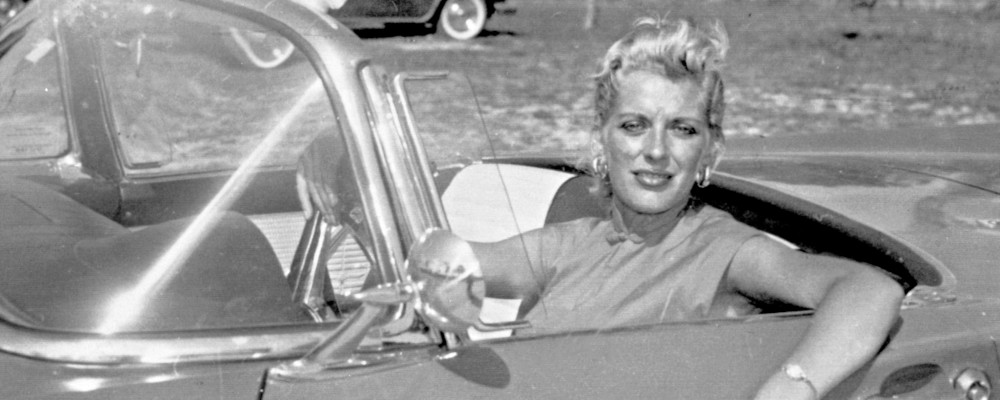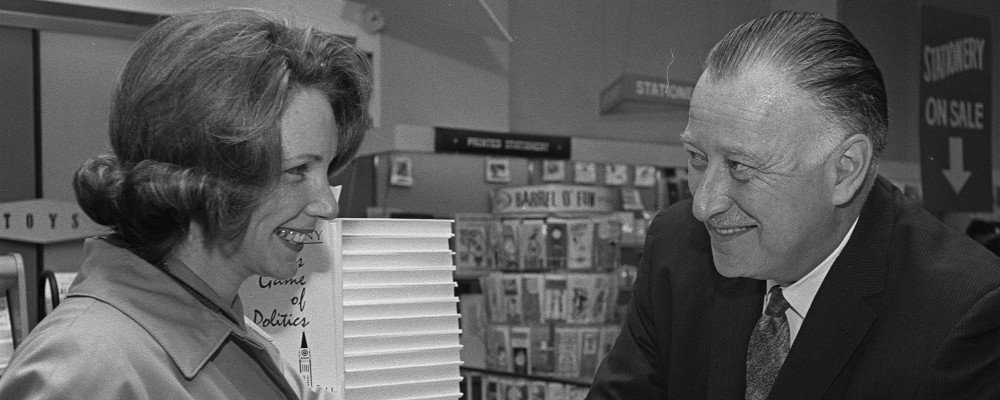The Hub is pleased to present a weekly column from author and historian Antony Anderson on the week that was in Canadian history.
March 4, 1966: The Munsinger scandal breaks.
It seemed like just the usual spittle flying across the aisle of the House of Commons. But beyond the angry present moment, there were old scores to settle. No one forgets anything in this place.
The year before, two Russian diplomats had been expelled for espionage. They had gone to great efforts to secure low-level information—photographs of a pipeline, maps of the lower B.C. mainland—from a low-level Vancouver postal clerk, one Victor George Spencer, a former member of something called the Canadian-Soviet Friendship Society and also the Canadian branch of the Communist Party, of which he was a member until he was kicked out for arguing too much with fellow comrades. The RCMP had gathered enough evidence to get Spencer dismissed from his job and stripped of his pension but not enough to take the case to trial. Instead, he was placed under permanent surveillance. A traitor to his country but an outraged civil servant nonetheless, Spencer demanded a day in court to regain his pension. The government, led by Prime Minister Lester Pearson, refused. The Opposition demanded an inquiry into what they described as police state tactics. The government again refused. A straightforward security case was congealing into a swampy civil rights issue.

On this day in March, the embattled Liberal minister of justice, Lucien Cardin, was going at it with Conservative leader, John Diefenbaker, the man who, as Cardin and the Quebec caucus saw it, had destroyed the careers of so many francophone colleagues. Speaking over Tory hecklers and Liberal cheers, Cardin lashed out at his grand nemesis, who would “pummel away at a chosen political opponent, heaping abuse, ridicule, scorn, accusations and insinuations of all sorts upon him with evident delight…The great executioner is now after my political neck”. Dief snapped back, “You committed suicide yourself.”
Cardin had come to the debate on Spencer and spying, armed with a concealed weapon: the knowledge of an old Conservative security file. In the heat of the moment, the minister of justice could no longer contain himself: “I can tell the Right Honourable gentleman that of all the members of the House of Commons, he—I repeat—he is the very last person in the House who can afford to give advice on the handling of security cases…Would he want me to go on and give more?”
Evidently, MPs were indeed hungry for more. Cardin then challenged Diefenbaker “to tell the House about his participation in the Monseignor case when he was prime minister of this country.” Diefenbaker retorted, “I am not worried. Have your commission look into it.” Cardin did not elaborate and discussion moved on to other topics. Very few people in Ottawa—a handful of senior RCMP officers, Pearson, Diefenbaker, and perhaps some half dozen current and former cabinet ministers—knew exactly who or what Cardin was referring to. But tout l’Ottawa was transfixed. The tantalizing glimmer of scandal hung like a slab of raw meat over a ravenous press. This was more than mere rumour. This was outright insinuation! It would be inhuman to resist.
Days later, Cardin held a press conference, going for broke. He declared this buried sex and security scandal was worse than the notorious Profumo-Keeler scandal in the United Kingdom, that more than one Conservative minister had been involved, and that he was considering re-opening the entire case. He also stated that the mystery woman at the centre of it all had died of leukemia. By now, whether he had mispronounced it or the Hansard clerk had misheard it, the name had been corrected. It wasn’t Monseignor. It was Munsinger.
A team of intrepid Toronto Daily Star reporters had been pounding the pavement and their groundwork paid off, for readers and profit margins. The day after Cardin’s press conference, a massive headline pulsated across the front page. It was the stuff of legend: “STAR MAN FINDS GERDA MUNSINGER: The Girl They Said was Dead.”
There she was, a real live femme fatale ensconced in an affluent Munich neighbourhood managing a coffee shop. In the effortlessly casual sexism of the day, the Star judged that Munsinger possessed “a still shapely figure…though past the first bloom.” And just for good measure, it added she “was still curvy and blonde but obviously deep in her thirties.” Not entirely surprised to be found, Munsinger opened up to the Star’s reporter with a familiar tale in that postwar era. She had joined waves of refugees escaping devastated Europe for well-fed North America, reaching Montreal, cleaning houses until her continental charm opened doors in the city’s nightclubs and beyond. Munsinger acknowledged that she had known the suave, dapper, and very married former associate minister of defence, Pierre Sévigny, no longer in politics. She further enlightened the Canadian reading public with news that she had also known another Conservative Cabinet minister. The staid Dominion now had its very own proper sex scandal. Pearson was compelled to launch yet another inquiry, or in Tory eyes, a witch hunt.
The story that emerged was at once banal and worthy of an eyebrow raised. Before emigrating to Canada, and her first attempt was denied, Munsinger had been convicted “as a common prostitute, a petty thief, and a smuggler.” She had consorted with a Russian intelligence officer and carried out some missions for him, albeit “of a minor character.” The report described her as a “thoroughly unreliable opportunist.” Perhaps more charitably, in that grim wartime aftermath, she can also be seen as a desperate survivor. Despite this record, Munsinger was eventually able to clear immigration into Canada.
Just appointed to Cabinet, Sévigny met Munsinger in September 1959 at a large function in Montreal. Chemistry ensued. Years later, Sévigny explained: “What happened between us is what happens between a beautiful woman who likes a man and a man who likes a beautiful woman, and that’s all.” Well, there was a tad more. Someone on Sévigny’s staff made calls on her behalf to a citizenship office regarding her application and also contacted the German consulate regarding her passport renewal. The report also noted that another Conservative minister George Hees had indeed met her—but only twice, and just for a lunch and a dinner.
Eventually, the RCMP took note, indeed took photographs, and presented the evidence in December 1960 to then-PM Diefenbaker. Sévigny was summoned, confronted, acknowledged the liaison, and insisted he had not revealed any state secrets to the shapely blonde from East Germany. Diefenbaker was furious, as Sévigny recalled, “I was duly and properly reprimanded and chastised. And he was right after all, let’s face it.” Given that there was no breach of security, Diefenbaker did not fire his minister, a decorated war hero, descended from a long line of prominent Conservatives. Was this gross incompetence, even dereliction of duty? A reasonable decision? Cold-blooded political calculus to avoid a public scandal?

These considerations were buried for the next six years until the inquiry raised fundamental questions about Diefenbaker’s failure to seek outside counsel in a matter involving a colleague, his failure to move Sévigny either out of cabinet or to a less sensitive post, or even to inform Sévigny’s successor about the potential for a security breach. Framing of these questions and conclusions will no doubt be swayed by one’s political allegiances.
In the end, there was not much sex and not much scandal. The report exonerated Sévigny on a key point—“there is no scintilla of evidence or any indication that there was any disloyalty involved”—but it criticized his judgement in choosing to conduct the affair, which revealed “a strong indication of his own unsuitability to hold any portfolio in the Cabinet, let alone the most sensitive one of Associate Minister of National Defence.”
This was a shabby ordeal members on both sides of the House wished to forget, so after the report’s release in September 1966, it was left to fade away. Munsinger lived in comfortable, relative obscurity thereafter, giving a handful of interviews to the CBC, dying in Germany in 1998. Sévigny had lost his seat in the 1963 election, went on to teach business administration at Concordia University, made attempts to reignite a political career at the provincial level, to no avail, and was appointed to the Order of Canada in 1994. He died, his loyal wife at his side, in 2004.
In retirement, Lucien Cardin looked back with regret clouded by an attempt to justify the unjustifiable: “All that came of it was sorrow and pain to many people…I felt that this was the only way we could put an end to the destruction of my colleagues in Parliament, and it was the only way we could avoid being destroyed as a party…I have never done this kind of a thing before, or since…somebody had to do it. That was the motivation. And judging from the results, nothing of which really changed anything, then of course the exercise was useless.”
Tragic.
Recommended for You

Conservatives should fight the culture war—but on a battlefield we can win

There is no room for pacifists in the culture wars

Letter to a minister: Want to boost the economy? Improve our transportation systems

Federal spending on Old Age Security will outpace child care, housing, and postsecondary education combined




